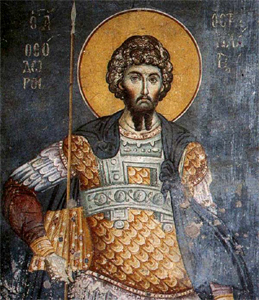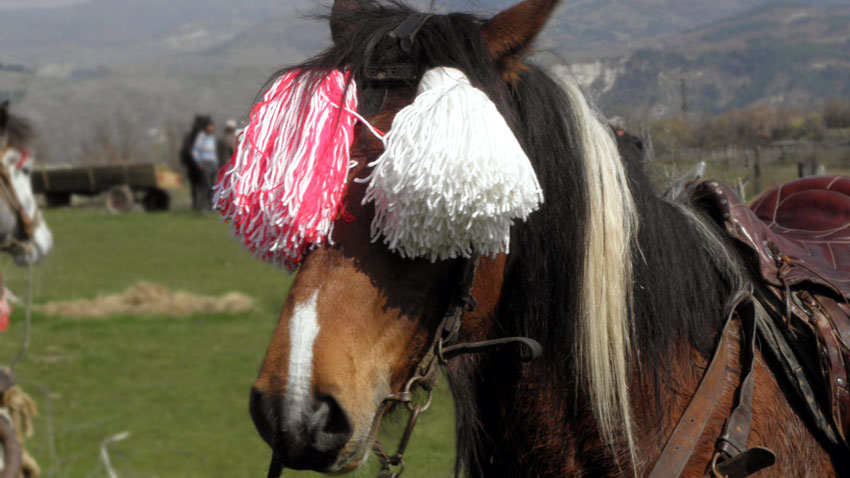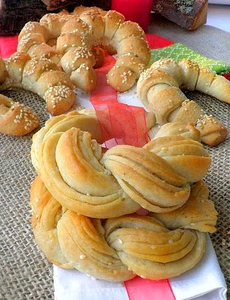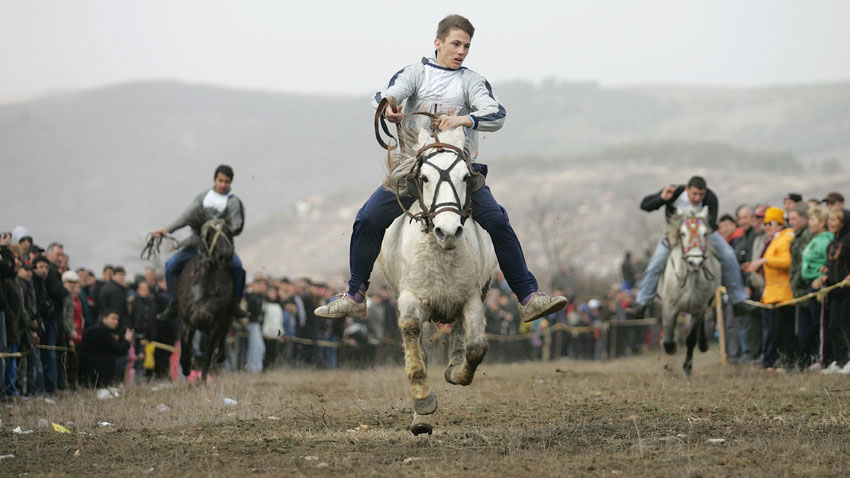 According to folk beliefs, on Todorovden Saint Theodore rides a white horse and goes to see God and ask him to bring summer. Each time Saint Theodore goes to see God he would stick his spear into the ground and fasten his horse to it. God always fulfills his wishes and sends summer to Earth. Later, the soil is getting warmer and a steam springs out of the place where Saint Theodore sticks his spear. That is why the day becomes longer after Todorovden and weather gests warmer. The feast always falls on the first Saturday of Lent. Todorovden, also known as Tudoritsa or Horse Easter is accompanied with a lot of fun and singing. Some of the folk songs have it that Saint Theodore is riding his white horse across the fields. Earlier, he shoes his horse in a green meadow and his sister stands next to him and passes him golden horseshoe cotters and silver horseshoes.
According to folk beliefs, on Todorovden Saint Theodore rides a white horse and goes to see God and ask him to bring summer. Each time Saint Theodore goes to see God he would stick his spear into the ground and fasten his horse to it. God always fulfills his wishes and sends summer to Earth. Later, the soil is getting warmer and a steam springs out of the place where Saint Theodore sticks his spear. That is why the day becomes longer after Todorovden and weather gests warmer. The feast always falls on the first Saturday of Lent. Todorovden, also known as Tudoritsa or Horse Easter is accompanied with a lot of fun and singing. Some of the folk songs have it that Saint Theodore is riding his white horse across the fields. Earlier, he shoes his horse in a green meadow and his sister stands next to him and passes him golden horseshoe cotters and silver horseshoes.
On Todorovden all rituals are connected with horse fertility. Even nowadays in many Bulgarian regions women knead ritual horse-shaped or horseshoe-shaped bread. However, people traditionally bake other types of bread such as ring-shaped  buns, bogovitsa (God's pita bread) and kolak typical of large folklore and religious feasts. On Saint Theodore's Day people also hand out boiled sweetcorn, boiled wheat, boiled peas, etc. Once women used to run, jump or even imitate horse neighing while visiting their relatives and handed out the ritual bread and the legume. They performed that ritual for good fertility of people and horses.
buns, bogovitsa (God's pita bread) and kolak typical of large folklore and religious feasts. On Saint Theodore's Day people also hand out boiled sweetcorn, boiled wheat, boiled peas, etc. Once women used to run, jump or even imitate horse neighing while visiting their relatives and handed out the ritual bread and the legume. They performed that ritual for good fertility of people and horses.
At the beginning of the 20th century Bulgarian ethnographer Dimitar Marinov recorded an interesting local custom in a village near Smolyan, in the Rhodope Mountains, called Bekane. On Friday before Todorovden women used to fill a bowl with peas and pour warm water over the peas. They would place the bowl in front of the icon. On Saturday morning when women return from the church liturgy they would take that bowl and give everyone some peas, the ethnographer further wrote. Later, women would take a handful of peas and throw them up saying prayers for all family members as well as for all domestic animals. Then, men would make bead out of those peas and wear them on their fur caps. In Sofia district people used to take boiled sweetcorn to church where the local priests would incense it. Later, people would scatter it on the ground and children would pick it for horses' health sake.
 Strictly observant Christians keep strict fasting in the week preceding Tudoritsa and women cannot do any handiwork - they do not spin, weave, cut out clothes or do any embroidery.
Strictly observant Christians keep strict fasting in the week preceding Tudoritsa and women cannot do any handiwork - they do not spin, weave, cut out clothes or do any embroidery.
According to folk beliefs, Saint Theodor is patron of harmful animals such as serpents, wolves, mice, moles, etc. Once, young brides would scatter corn in their vegetable gardens, in order to chase moles away. Men ride horses across the fields, because the superstition has it that moles would not dig tunnels into the soil if horses step on it.
On Todorovden young men take part at horse races also known as kushii. Every household would bring their horses out with wild geranium and hellebore in their manes. While the men got the saddles and the reins ready women would sing songs. After the race everyone would return to the village together with the winner riding up front. Once, the lasses and the lads used to form a long horo chain around the horses and their riders. The owner of the horse that outdistances all others would receive guests. Many Bulgarians are still following those traditions. People named Todor, Todorka, Theodor, Theodora celebrate their name day on Saint Theodore's Day.

English version: Kostadin Atanasov
Photos: BGNES
The audio file contains the following folk songs dedicated to the feast:
1 Saint Theodore shoes his horse, to the rendition of Svetoglas
2 Todor Sabira Tragnuva, to the rendition of Georgi Pavlov
3 Taz Nedelya Todorishka, to the rendition of Yovka Boycheva
4 Todor si Konche Styagashe, to the rendition of Bilyana Sokolova
5 Todor si Konche Karashe, performed by Plamen Dimitrov
Christmas Eve, once called Budnik, Little Christmas or Neyadka, was considered part of a dark, frightening period, charged with the potential to influence the entire upcoming year. For this reason, the night before Christmas was associated with..
It's Ignazhden! On St Ignatius' Day, 20 December, we honour the memory of St Ignatius the Theophorus. In the Bulgarian calendar St Ignatius' Day (Ignazhden) is not only a religious but also a folklore holiday. According to national tradition, it is..
Eight authentic Bulgarian traditions and skills, passed down through generations, have been added to the National Representative List of Bulgarian Intangible Cultural Heritage of Humanity, becoming part of Bulgaria's Living Human Treasures. "This..

+359 2 9336 661
